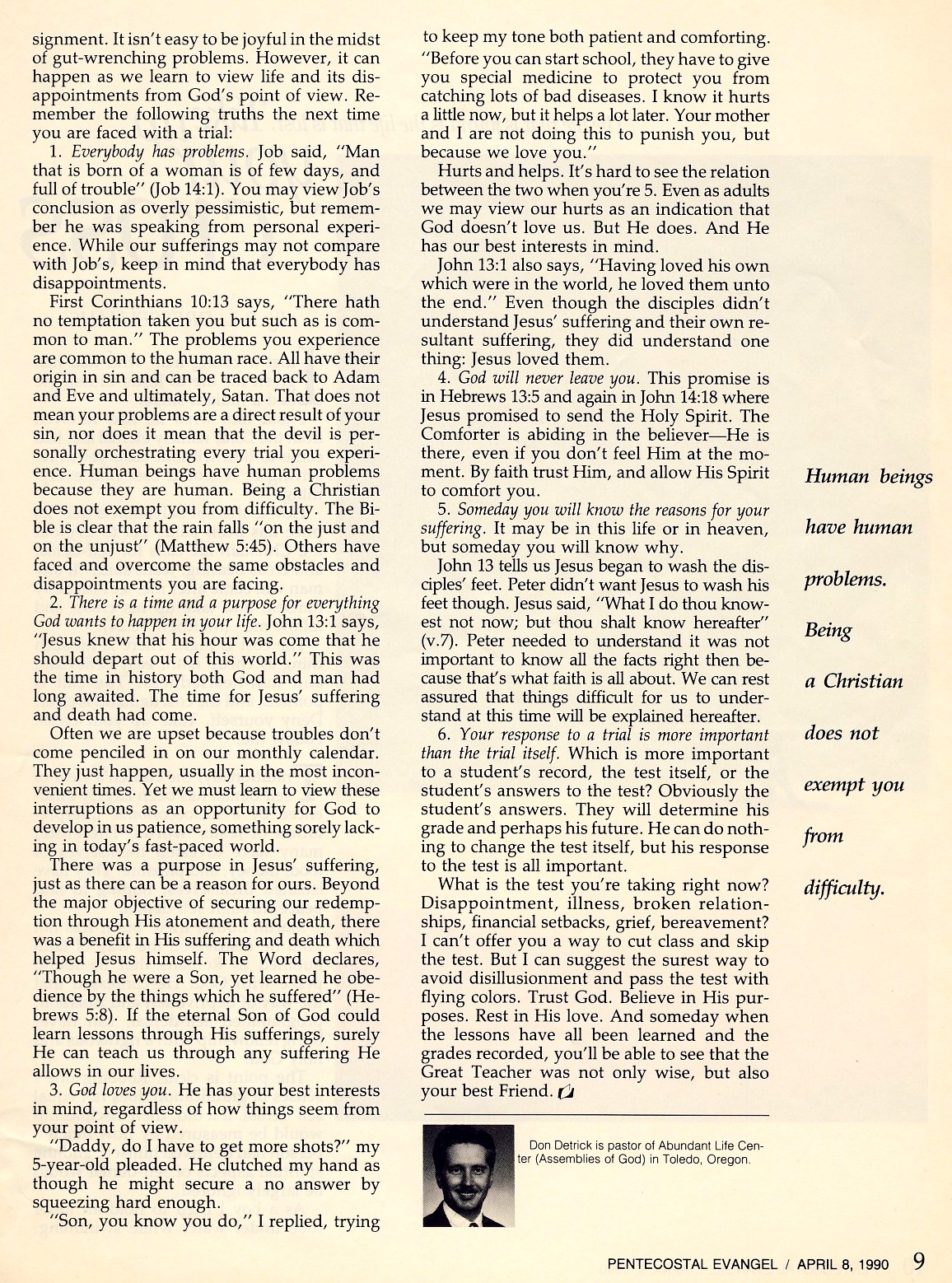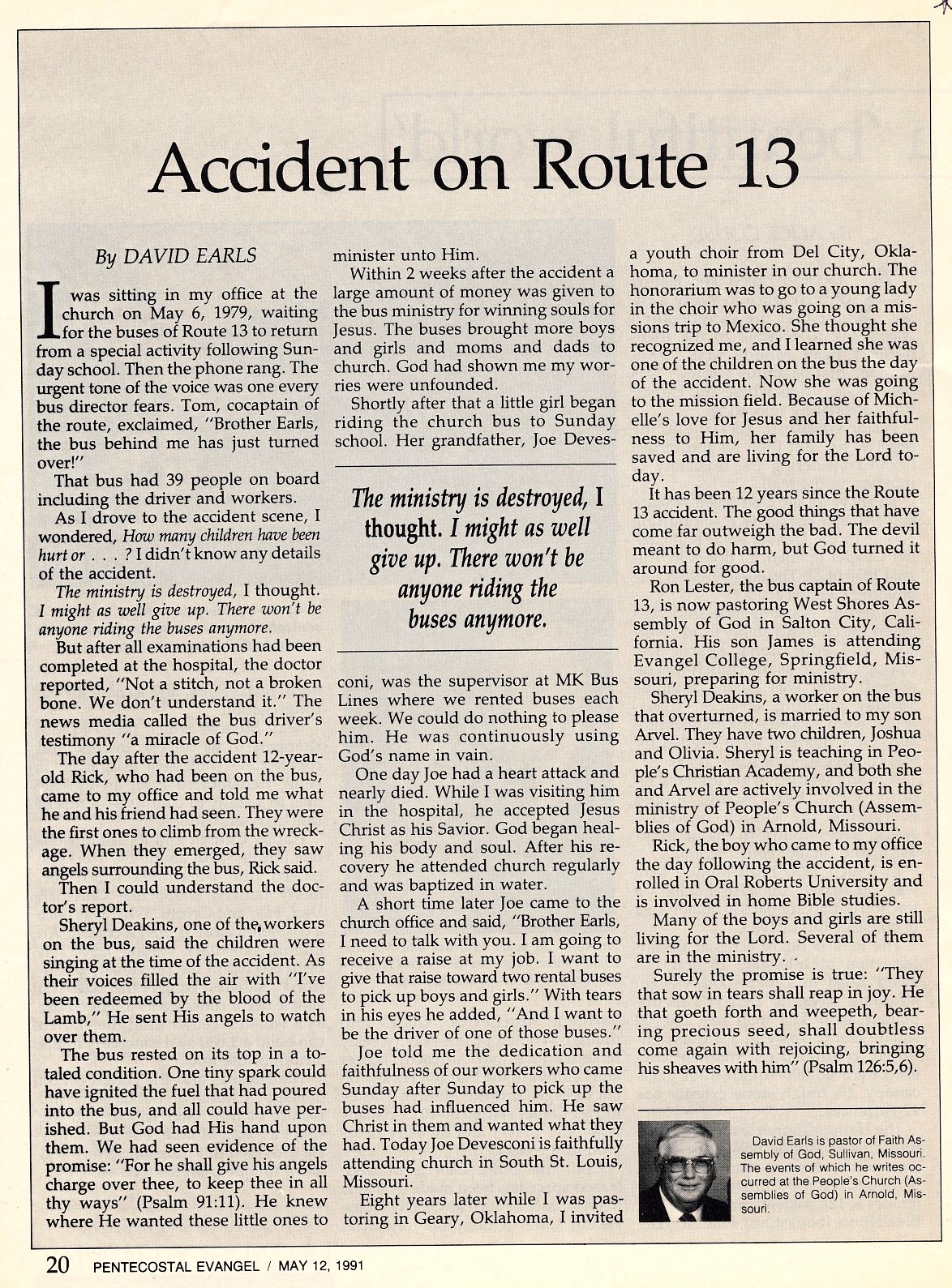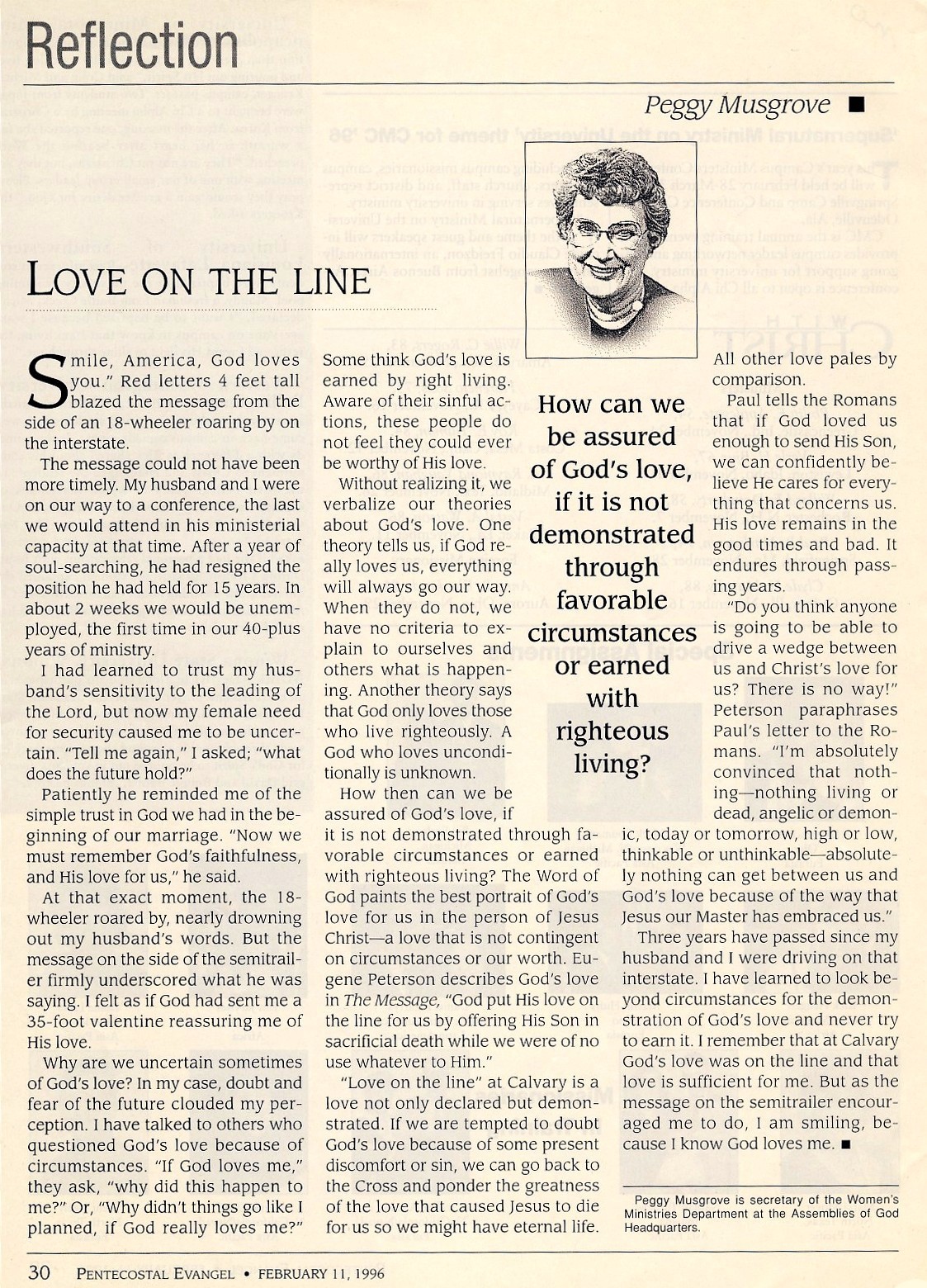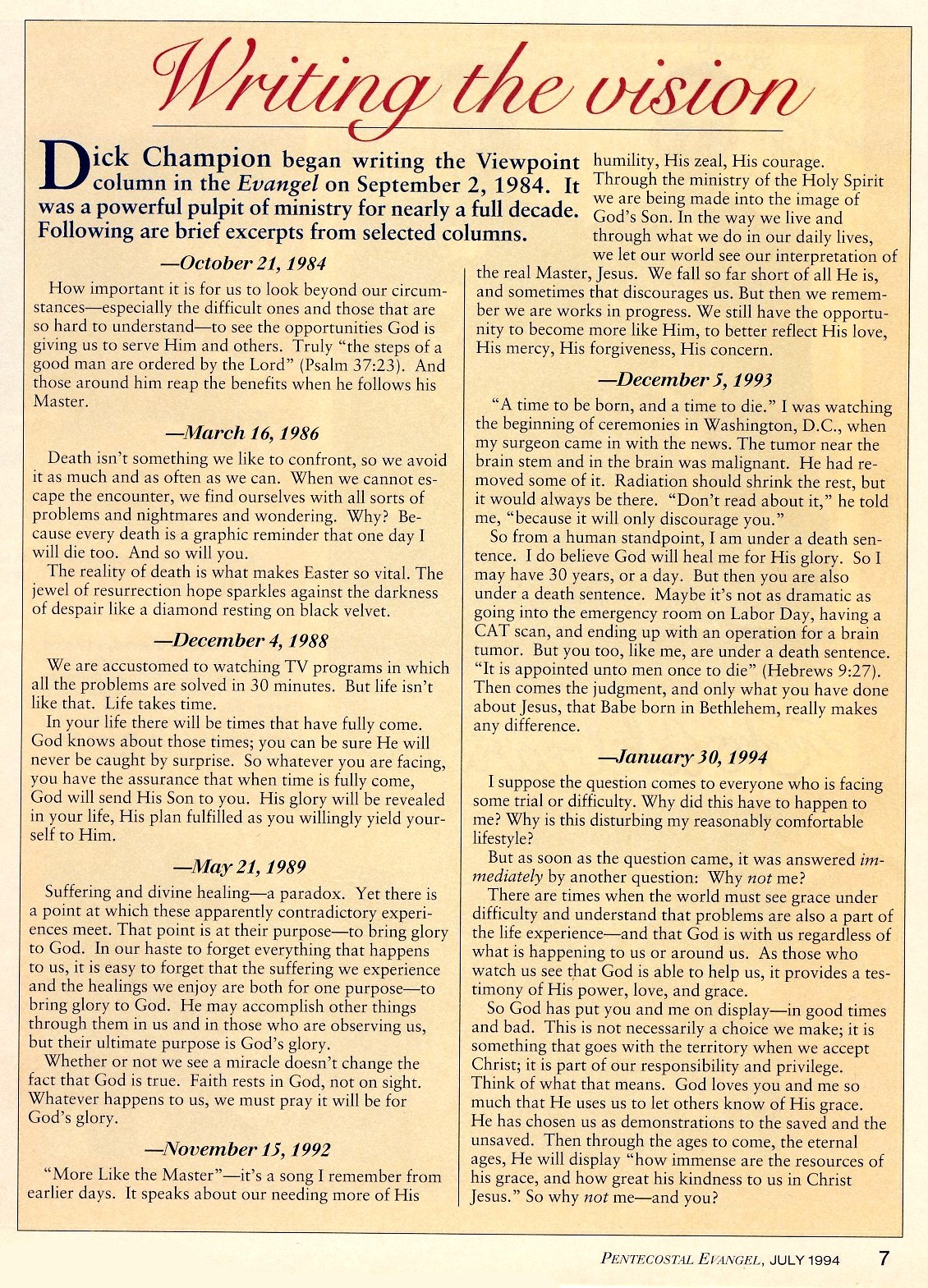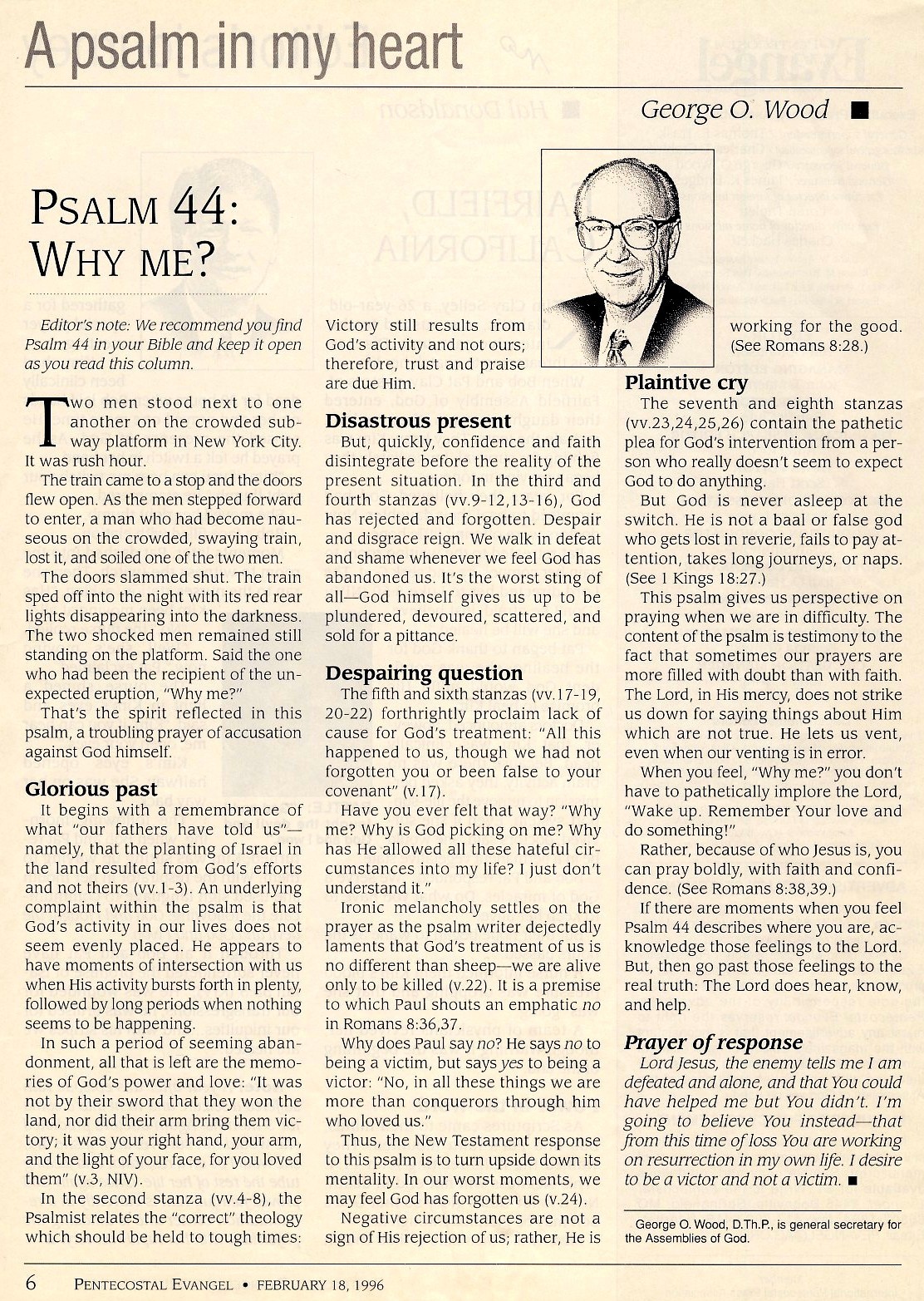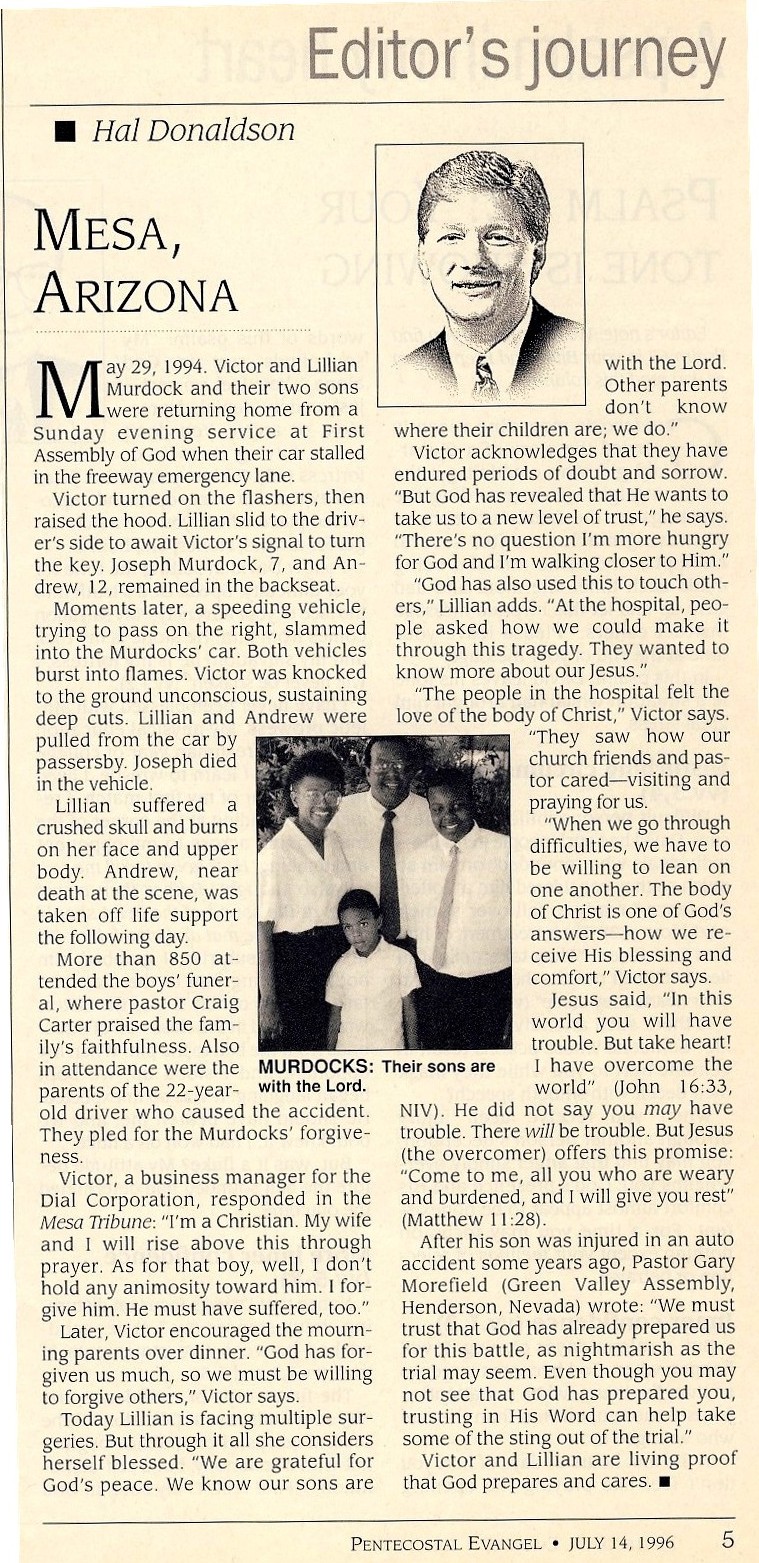
Why Do Bad Things Happen to Good People?
(A Christian Perspective)


All Christians Have Problems
What Jesus Said About Problems
Persecution
Our Sin Nature Causes Us Problems
The Sins of King Saul and King David
Satan Causes Problems
Love for Yourself and Others
Some Signs on How to Recognize the Last Days
Israel is God's Time Clock
Physical Death

We live in a hostile environment on this planet. There are accidents, diseases, "natural" calamities, famine, old age, death, family problems, substance abuse problems, genetic problems, and man's inhumanity to man including violent crime, war, rape, etc. just to mention a few.
The Bible teaches us that as Christians we have to conquor the world, the flesh, and the devil. Lane G. Adams deals with these issues in his book. He likens our Christian walk as to taking an airplane ride. This is a great book by a great Christian writer. I quote selected passages from his book but I recommend that you purchase this book (if you can still find it) to add to your Christian library.

"It was a rather typical Friday-afternoon crowd on the plane that lifted off from LaGuardia Airport on that hot spring day. One could tell that most on board were veterans as far as travel was concerned: executives, salesmen, technicians, government workers and others traveling for their companies or causes. Some knew each other. The general relief of going home was making for free conversation, while the stewardesses hurried up and down the aisles delivering cocktails and highballs. It seemed more like a commuter train bound for the suburbs than an airliner headed for Washington. The captain had turned off the seat-belt sign and the smokers were turning the cabin blue as, one after another, they fired up. Outside, the sun shone brightly and clouds appeared in the distance.
The sledge-hammer blow from above was as if some mad giant had smashed his clenched fist down on the top of the plane with a crashing sound. The plane plummeted hundreds of feet in seconds. The stewardess rose crazily to the ceiling! People shot out of their seats! Those who were belted in watched their drinks slush upwards out of their glasses! Now an equally ferocious blow caught the plane from the bottom! The stewardess was crumpled back into the aisle, people were banged back into their seats, and by now the overhead racks were virtually emptied of coats and other smaller items. Instinctively, I shot a glance out at the wings and was surprised to see that they were still intact. We endured yet one more resounding blow from above and then leveled out into turbulence of a less severe nature. The captain apologized, but indicated he'd had no warning. Only now was the plane beginning to move into the clouds I had seen in the distance. In spite of the fact that we flew the rest of the way to Washington
through line storms, we never again encountered the severity of turbulence that had hit us in the clear air. We had been victims of the CAT. Some victims never live to tell about it.
Clear Air Turbulence. The CAT. Turbulence in the air has usually been associated with storm clouds, but when planes began flying high enough to get into the Jet streams, this new phenomenon was discovered. Storm clouds will show up on radar, and in daytime they can be seen visually; but there is no way yet known to detect clear air turbulence, except by running into it and then sounding a warning to other planes that there is turbulence in the area.
In similar fashion, I wish to issue a warning to all Christians everywhere to fasten your seat belts, please! There is turbulence ahead whether you can see it or not! To all who have experienced that glorious spiritual lift-off, I say, "Fasten your seat belts, please."
There seems to be a general misunderstanding abroad to the effect that a real Christian is someone who doesn't have any problems, difficulties, or tragedies to contend with, as other people do. The idea conveyed is that a "victorious Christian" (whatever that is) is a person who always walks around with a big toothy smile on his face indicating that he's got life licked, including all its problems. An even more insidious wrinkle on this same theme implies that if this "real Christian" does have problems, it is because there is something drastically wrong with his relationship to Christ; or that he is hiding some deep, dark and mysterious sin that needs confessing.
It doesn't take the new Christian long to acquire this erroneous picture. He observes that not many other Christians are admitting to having any difficulties in their marriages, or with their kids; or that they are fighting temptation or discouragement. So he learns to cover up, too, and begins to feel like the world's biggest hypocrite. He is quite sure that he is the only one who believes in Christ and still manages to run into all kinds of turbulence in his life. Well, to any of you who feel this way I say, "Welcome to the club." You have plenty of company.
"The good man does not escape all troubles� he has them too. But the Lord helps him in each and every one."
Sin, like a turbulent cloud, is most usually the visible and understandable reason to fasten your seat belts. But it must be admitted that, like clear air turbulence, there are tragic events which can hit our lives and the lives of others, for which one cannot find either a visible or understandable cause.
Not uncommonly people say to me, "Explain to us why the innocent suffer, why people are starving to death, why there is cancer. Tell us why there is war, and why babies are born deformed. Perhaps we might believe in your God of love if we knew the answers." I have no glib or facile words of explanation for these events.
Time and again the Bible struggles with this subject of unexplainable tragedy, offering some help, but always ending short of a fully satisfying answer to the problem. The Lord Jesus was once asked to explain the incredibly inhuman horror which Pilate perpetrated, when he dismembered some Jewish worshipers in the Temple and mixed their bodies with the animals which they had brought. Pilate then sacrificed the whole lot. What an opportunity to expound on the depravity of man as represented in Pontius Pilate! But Jesus' piercing answer was,
"Do you think they were worse sinners than other men from Galilee? ... Is that why they suffered? Not at all! And don't you realize that you also will perish unless you leave your evil ways and turn to God?" He went on, "And what about the eighteen men who died when the tower of Siloam fell on them? Were they the worst sinners in Jerusalem? Not at all! And you, too, will perish unless you repent."
They had brought up a tragedy for which there was a visible cause, Pontius Pilate. But Jesus brought up a tragedy for which there was no visible cause, either in the character of the people who perished or in the collapse of an impersonal tower. It was easier to offer an answer to the first tragedy than the second, but He seems to have offered an explanation for neither. What did He mean by that puzzling reply,
"And you, too, will perish unless you repent"?
Perhaps Jesus was saying, "Unless you change the evil inside yourself over which you have control, how will you ever accept those evil events outside of yourself over which you have no control?"
It may well be that Jesus also is demanding a more honest sense of proportion in viewing evil in the world. Unexplainable tragedies, like the collapse of the tower of Siloam or any natural disasters, make up such a tiny percentage of the evil in this world, while man's inhumanity to man is directly responsible for all the rest of humanity's suffering and exploitation. Why then stumble over the lesser evil and ignore the greater? Solve, first, the larger sin problem within, before trying to understand the place of natural disaster without.
While it must be admitted, in honesty, that conversion to Jesus Christ does not guarantee a rational explanation for the clear air turbulence of natural disaster, it does introduce you to the absolute goodness in the character of God. This leads one to be able to trust God because of what He is, rather than trusting Him because of explainable circumstances. The National Weather Service states that ninety to ninety-five percent of all serious turbulence is caused by clouds, and that only five to ten percent fits into that mysterious category, clear air turbulence. Surely the same proportions, or greater, apply to the cause of evil in this world. Could any reasoning mind reject God because of five to ten percent of life's events which cannot be explained? The believer learns to trust the good character of God with that mysterious ten percent. He also trusts that God is able to work
"all things...together for good to them that love (Him), to them who are the called according to his purpose?"
Since the visible clouds of human sin cause ninety to ninety-five percent of the turbulence in life, let's put our attention to where the major problem lies. As a matter of fact, Jesus warned His disciples that they could expect trouble because they had believed in Him as Lord and Saviour. He said,
"If they hated Me, then you can expect that they will hate you!"
He warned of severe turbulence in their lives, but He also promised them that He would be with them and give them the strength to endure whatever godless men could cook up.
Paul testifies that this was the case in his life. He even begins his second letter to the Corinthians by saying,
"I think you ought to know...about the hard time we went through in Asia...that we despaired even of life itself."
Peter testifies to the same thing. He writes:
"There is wonderful joy ahead, even though the going is rough for a while down here. These trials are only to test your faith, to see whether or not it is strong and pure. It is being tested as fire tests gold and purifies it� and your faith is far more precious to God than mere gold; so if your faith remains strong after being tried in the test tube of fiery trials, it will bring you much praise and glory and honor on the day of his return"
We live in a sinful world, and that world's continuing violation of the commandments of God guarantees a turbulent society in which to live. Misguided Christians have tried to avoid the impact of the sin of others by backing off from this world behind monastic walls, or by otherwise isolating and insulating themselves. They soon discover, as Martin Luther did, that the Devil authors this disobedience, and that he can climb monastery walls. It should be obvious to all that the rejection of God and His authority, as well as the rejection of human authority, is bound to have a social effect. Hatred and killing, lying and stealing, immorality and covetousness make for rough going anywhere and anytime, under any kind of political regime. Jesus said that His disciples would be in this world, but that they would not be of it
But that probably will not jolt him half as much as the sin in himself. It's laughable that we even dare to say, "No one is perfect." Implied is the idea that some of us have come close to perfection but just missed it by a hair. The Apostle John wrote to a group of Christians,
"If we say that we have no sin, we are only fooling ourselves, and refusing to accept the truth....If we claim we have not sinned, we are lying and calling God a liar, for he says we have sinned"
Paul spelled out the Christian's situation clearly when he wrote,
"For we naturally love to do evil things that are just the opposite from the things that the Holy Spirit tells us to do; and the good things we want to do when the Spirit has his way with us are just the opposite of our natural desires. These two forces within us are constantly fighting each other to win control over us, and our wishes are never free from their pressures"
For the Christian, even that rough going shows the kindness and love of God. How? The writer to the Hebrews explains:
"...Have you quite forgotten the encouraging words God spoke to you, his child? He said, "My son, don't be angry when the Lord punishes you. Don't be discouraged when he has to show you where you are wrong. For when he punishes you,...it proves you are really his child." Let God train you, for he is doing what any loving father does for his children...For whoever heard of a son who was never corrected? If God doesn't punish you when you need it, as other fathers punish their sons, then it means that you aren't really God's son at all� that you don't really belong in his family....God's correction is always right and for our best good, that we may share his holiness"
You might well be saying to yourself, "Man alive, if the Christian life is so rough, why bother?" The non-Christian life is even rougher, and with no reasonable explanations or purposes behind any of the difficulties. But most important of all, the non-Christian misses out on the loving fellowship of God providing safety in the midst of his trials� not to mention his missing the power of God to show him where the smooth air is, or give him both the courage and patience to ride out the storm.
When that awful, chattering turbulence was slamming that airliner around I thought it would never end...but it finally did, much to my relief! Time slows down when trouble strikes, but Paul reminds us,
"These troubles and sufferings of ours are, after all, quite small and won't last very long. Yet this short time of distress will result in God's richest blessing upon us forever and ever! So we do not look at what we can see right now, the troubles all around us, but we look forward to the joys in heaven which we have not yet seen. The troubles will soon be over, but the joys to come will last forever"
Jesus said,
"These things I have spoken unto you, that in me ye might have peace. In the world ye shall have tribulations but be of good cheer; I have overcome the world"
"Fasten your seat belts, please!" If you keep that warning in plane view, you'll never be caught off your guard as you make good your flight path through this turbulent world.
Of course, there is the matter of your final destination to consider. You have considered it, haven't you?"
"Most people are bothered by those passages in the Bible that they do not understand;
"I believe it was Lord Acton who said, "Power tends to corrupt and absolute power corrupts absolutely." But, long before he said it, the life of King Saul recorded the sad deterioration of a man of humble beginnings ending up with too much power. Unwilling to submit to the authority and direction of the King of heaven, his unrepentant life came to a tragic conclusion. Before his death he even descended to the appalling depths of witchcraft and communication with the dead. Granted that none of us has ever had his kind of power, but how do we use or misuse the power we do have? At work? At home? Saul wanted the advantages of a religion which could give him some sort of assurance for his future, without making any moral demands on his present personal life. This is why he inevitably ended up looking for answers in the occult. Today's obsession with astrology, seances, witchcraft and the occult has its origins in the same desire� a religion without moral demands! Programmed
into the pages of this ancient book, the Bible, are relevant warnings that are startling in their contemporary applications. We can vicariously fly Saul's crash course in the great life Simulator and then resolve that by God's grace we'll avoid that kind of crash in our own lives.
Remember David? The shepherd boy who became king of Israel? It is hard to imagine a more remarkable combination of talents and human qualities. He had it all: brave and aggressive, tender and compassionate, a military genius, a literary giant, superb musician, a great leader of men. Yet during an idle moment, a casual stroll in his roof garden started a chain of events that led to adultery, an illegitimate pregnancy, and, finally, an arranged murder. It was during this stroll that he saw Bathsheba, his neighbor's wife, bathing. Her exceptional beauty was such a stimulus to David that he sent for her; and, in spite of the fact that her husband was off fighting David's war, she willingly engaged in sex with him on the first meeting. The resultant pregnancy pushed David into a desperate and despicable effort to cover up his sin by recalling Bathsheba's husband from the front. When he wouldn't go home to his wife, David ordered him back into the war, with treacherous instructions to his commanders to put
him in the hottest part of the fight (and then contriving a withdrawal), assuring his death.
One can almost move step by step with David's mental process. First the overwhelming visual stimulus, then the mental fantasy of the exciting details of sex with Bathsheba, then the move to do what he knew was wrong, then the need to cover up which led to a cowardly murder.
Only the prophet Nathan's confrontation of David with the awfulness of what he had done, trapping him in his own condemnation, brought from him heartbroken repentance and confession. Psalm 51 is David's cry to God for forgiveness. From this we see that David knew where the problem originated. He pinpointed his (and our) problem when he prayed,
"Create in me a new, clean heart, 0 God, filled with clean thoughts and right desires"
"...a man must accept the reality of the ill wind in life as a grave danger in spite of the fact that he cannot see "it," only its effects. J. S. Whale, the Cambridge scholar, wrote a book in 1936 entitled, The Christian Answer to the Problem of Evil. In 1957 I heard him say, "I really ought to rewrite the book! Now I'd have a lot more to say about the Devil!" The years of experiencing life in this world had taught him the grim reality of evil.
My friend, Calvin Thielman, pressed for his reasons for believing in a personal devil, answered, "I believe in a personal devil because the Bible says so, and because I've done business with him!"
The Bible says we humans naturally tend to be,
"...blown about by every shifting wind of the teaching of deceitful men, who lead others to error by the tricks they invent"
Next, we need to discover the direction from which the evil comes and face it even if it means acknowledging that the greatest source is within ourselves.
Anything that takes us away from God and good should be suspect. To gauge the force of evil's effect upon us, we simply have to compare our lives to the life of Jesus Christ. He kept the Ten Commandments so perfectly that even His worst enemies could not convict Him of sin. Jesus' life is what the Ten Commandments look like when lived out in day-to-day personal and corporate relationships. Therefore, His conduct represents the perfect God-pleasing course through life. It is when we try to obey the Bible and
"follow His steps"
Mature Christians all testify that the provisions they made for both the force and direction of the ill wind of yesterday must be altered for today's temptations. The Devil is the arch deceiver and once he sees we have made the necessary corrections for certain of his temptations, he changes the force and direction of his ill wind. In the beginning of a Christian's life, he is struggling to keep from being blown constantly off course into the sins of the flesh. When the presence of Christ gives him victory here (and he's making good progress on a true course), all the Devil then has to do is stop that ill wind from blowing and our hero is in danger of flying off into the sin of smug self-righteousness which, again, brings him on the opposite side of his God-given track.
"For this purpose the Son of God appeared, to destroy the works of the devil."
Only as Jesus Christ by His Spirit controls a man's life on a daily basis, can he hope to be able to make the constantly changing course corrections to defeat the ever changing patterns and forces of Satan's ill wind."
Sow the seed of love
"...this internal change of life that is produced when your heart is put under the Holy Spirit's control will inevitably change both your attitude and action where other people are concerned. It is as simple as this: You'll begin to care about others! And you'll be prepared to do something to aid them in both their spiritual and physical needs. Jesus said,
"Love each other just as much as I love you. Your strong love for each other will prove to the world that you are my disciples"
The prerequisite for involvement with others, in honesty and in love, is to learn to care for (love) yourself first in the same way. The Bible says,
"God showed his great love for us by sending Christ to die for us while we were still sinners...When we were utterly helpless with no way of escape, Christ came at just the right time and died for us sinners who had no use for Him"
To care for (love) yourself is to accept yourself as you are, facing the truth honestly about both your vices and your virtues. Here I would say, no, God is not going to let you remain the way you are. By taking over your life from the inside, He intends to change you so that you
"should become like his son"
Christians are like tea bags
"Paul said,
"You may as well know this too...that in the last days it is going to be very difficult to be a Christian. For people will love only themselves and their money; they will be proud and boastful, sneering at God, disobedient to their parents, ungrateful to them, and thoroughly bad. They will be hard-headed and never give in to others; they will be constant liars and troublemakers and will think nothing of immorality. They will be rough and cruel, and sneer at those who try to be good. They will betray their friends; they will be hotheaded, puffed up with pride, and prefer good times to worshiping God. They will go to church, yes, but they won't really believe anything they hear. Don't be taken in by people like that."
The Lord Jesus spoke so clearly of things that could only be related to our time in history that it will make the hairs stand up on the back of your neck. He said,
"They (the Jews) will be brutally killed by enemy weapons, or sent away as exiles and captives to all the nations of the world"
(fulfilled in A.D. 70);
"and Jerusalem shall be conquered and trampled down by the Gentiles (non-Jewish people) until the period of Gentile triumph ends in God's good time."
(In 1967 the Jews recaptured all of Jerusalem for the first time since long before those words were spoken.)
"Then there will be strange events in the skies� warnings, evil omens and portents in the sun, moon and stars"
(Neil Armstrong set foot on the moon in 1969);
"and down here on earth the nations will be in turmoil, perplexed by the roaring seas and strange tides."
(Recent Gulf Coast tidal waves, plus the tidal disaster at the Bay of Bengal, exceed in severity anything in the history of those areas.)
"The courage of many people will falter because of the fearful fate they see coming upon the earth, for the stability of the very heavens will be broken up."
(Could this point toward pollution either from atomic fallout or Just plain air pollution? See also
When you add to that the statement of Jesus, in the Gospel of Matthew, about famine, wars and earthquakes, and look out on the world scene with its endless wars, increase of earthquakes and threat of serious world famine, you can only marvel at the convergence of all these events in our time in history.
The Bible is full of indications that the nation of Israel will be reconstituted in the land as an independent people during the end times. It has happened, and the magnitude of the military victories which this tiny nation has achieved, against all odds, rivals any victories of ancient Israel in Bible times. They have rebuilt the waste places even as the Bible said they would, restoring the old ruins and causing the desert to blossom like the rose
It is true, every generation from New Testament times until now has had among them those that felt that the return of Jesus Christ was imminent. But it is also true that this generation now alive is beginning to see a convergence of Bible prophecy fulfillment more detailed and sweeping than any other time in history. My suggestion is that each individual study the Scriptures for himself, and then be persuaded in his own mind as to whether or not the end is in plane view.
None of us likes to think about the end whether it be personal or collective. In spite of the fact that we either see or hear of persons whose lives have ended every day, we do everything possible to crowd out any thought of death happening to us. But the Christian who has been lifted off into the heavenlies, with Jesus Christ, has a startling fact to hang on to, which casts the whole matter in a new perspective. For him life is eternal now as well as later. Jesus said,
"How earnestly I tell you this� anyone who believes in me already has eternal life!"
Yes, the Christian dies in his body. The Bible has a ready explanation for that.
"Yet, even though Christ lives within you, your body will die because of sin; but your spirit will live, for Christ has pardoned it"
A tribute to Lane G. Adams:
(Psalm 34:19) (Living Bible)
(Luke 13:1-5) (Today's Living Bible TLB)
(Romans 8:28) (King James Version KJV)
(2 Corinthians 1:8, TLB) In chapter 11 of the same letter, he itemizes some of the difficulties he endured. That list is enough to curl your hair. But in the opening chapter he lets us know in advance that he sees a reason for all the troubles. Having had such experiences himself, he is able to report to us how God has met his need, and that He can be depended on to meet our need under similar suffering. These difficulties revealed to him the marvelous character of God in the comfort he received, thus causing him to love God more.
(1 Peter 1:6-7) (TLB). How much easier it is to pass the tests when you are forewarned that they are coming, and that the God who loves you has a purpose in them. Peter says not to think it strange when trials arise.
(John 17:15-16, TLB). The tranquility of the Christian's flight through this life is going to be jolted from time to time by the turbulent sin in the world.
(1 John 1:8,10, TLB).
(Galatians 5:17, TLB). It almost seems too simple to say that the Christian only has to decide which of these two forces he intends to cooperate with in his life, to determine whether he is going to be faced with ongoing turbulence or peace. To whatever degree he follows the Holy Spirit, to that degree he will know love, joy, peace, patience, kindness, goodness, faithfulness, gentleness and self-control. To follow the lower nature a large percentage of the time will produce increasingly rough going.
(Hebrews 12:5-10, TLB). So that severe shock which you brought on yourself may well be understood as your heavenly Father trying to get through to you, that you're on the wrong track. Realistically, and sympathetically, that same writer to the Hebrews adds,
"Being punished isn't enjoyable while it is happening� it hurts! But afterwards we can see the results, a quiet growth in grace and character."
(Hebrews 12:11, TLB).
(2 Corinthians 4:17-18, TLB).
(John 16:33, KJV).
Quoted from Lane G. Adams, Come Fly With Me, Chapter Two, Fasten Your Seat Belts, Please, Regal Books (G/L Publications), Glendale, Calif., 1973, pages 16-26.
I have always noticed that the passages that bother me the most are the ones
I do understand."
- Mark Twain
(Psalm 51:10). In David we see the potential for evil in the best and most talented of us."
Quoted from Lane G. Adams, Come Fly With Me, Chapter 5, The Simulator, Regal Books (G/L Publications), Glendale, Calif., 1973, pages 52-53.

(Ephesians 4:14 Todays English Version TEV). If we are to stop being blown about, we need to accept as a reality the presence of evil in this world, not only objective to us but subjectively within us.
(1 Peter 2:21 KJV) that we see clearly how far away from His course of conduct we actually are. Only Jesus Christ indwelling a man can impart to him the ability and direction to make a true track through this windy world.
(1 John 3:8 Berkeley). That's good news for those of us who are so easily taken off course by the ill wind that blows no man to good. The next verse goes on to tell how Christ accomplishes this.
"The person who has been born into God's family does not make a practice of sinning, because now God's life is in him; so he can't keep on sinning, for this new life has been born into him and controls him� he has been born again."
(1 John 3:9 Living Bible). This new life, the very life of God, is born into the believer and controls him. This is how Jesus Christ defeats the ill wind from any direction and at any force. The Bible says to the believer in a very personal way,
"You are from God...and have defeated them, because the One in you is greater than the one in the world"
(1 John 4:4 Berkeley).
Quoted from Lane G. Adams, Come Fly With Me, Chapter 6, An Ill Wind, Regal Books (G/L Publications), Glendale, Calif., 1973, pages 64-67.
And
Watch God give the harvest
(John 13:34-35). The name of the game is love in human relationships. It begins in the home, and extends to your job, civic responsibility and leisure time. The Christian life begins and continues with an intimate and honest relationship with Jesus Christ, but it must extend into other relationships where you meet and are involved with people.
(Romans 5:6,8). Get a good grip on this startling truth! God's love is demonstrated by His acceptance of us as we are. He accepts us in spite of what we are, and not because of what we are.
(Romans 8:29). You don't change in order to come to God, you come to God in order to be changed. As stated by a prisoner writing from jail: "Finally I see it! God doesn't change us in order to love us. He loves us in order to change us!" (Written to me by a black prisoner in the Dade County Jail, Miami, Florida. He had only four years of education.) It is this kind of loving acceptance from God that gives us the ability to accept ourselves as the unique, original persons for whom Christ died. Loving others begins with our acceptance of them as they are. God alone is in the people-changing business."
Quoted from Lane G. Adams, Come Fly With Me, Chapter 9, The Automatic Pilot, Regal Books (G/L Publications), Glendale, Calif., 1973, pages 96-97.
You have to observe them in hot water
Before you know how strong they are
(2 Timothy 3:1-5).
Revelation 9:18.)
"Then the peoples of the earth shall see me, the Messiah, coming in a cloud with power and great glory. So when all these things begin to happen, stand straight and look up! For your salvation is near!"
Then he gave them this illustration:
"Notice the fig tree, or any other tree. When the leaves come out, you know without being told that summer is near. In the same way, when you see the events taking place that I've described you can be just as sure that the Kingdom of God is near. I solemnly declare to you that when these things happen, the end of this age has come. And though all heaven and earth shall pass away, yet my words remain forever true. Watch out! Don't let my sudden coming catch you unawares; don't let me find you living in careless ease, carousing and drinking, and occupied with the problems of this life, like all the rest of the world. Keep a constant watch. And pray that if possible you may arrive in my presence without having to experience these horrors"
(Luke 21:24-36).
(Isaiah 58:12;61:4; Ezekiel 36:33-36).
(John 6:47). When the living Christ enters a person by His Holy Spirit, a new quality of life is imparted to the believer and experienced now. It's like the difference between taxiing a plane around on the ground and taking to the air. A whole new dimension of things has been introduced. A new liberty with new possibilities arising out of a new set of values comes into view. A personal potential which has limits sheds those restrictions as God challenges the believer with His invitation,
"Call unto me, and I will answer thee, and shew thee great and mighty things, which thou knowest not"
(Jeremiah 33:3). Despite what the critics say, Christianity is not merely "pie in the sky by and by." It is eternal life here and now!
(Romans 8:10). The last vestige of sin dies with the body and our spirits are brought into the presence of the One who pardoned us through His death and bodily resurrection."
Quoted from Lane G. Adams, Come Fly With Me, Chapter 10, On a Clear Day You Can See Forever, Regal Books (G/L Publications), Glendale, Calif., 1973, pages 110-113.

Lane Adams was a U.S. Naval Air Combat aviator during World War Two. He served as an evangelist with the Billy Graham team. He was also an evangelism minister at the First Presbyterian Church of Hollywood, California.


![]() The problem of Evil and Suffering in the world in which we Live
The problem of Evil and Suffering in the world in which we Live
![]() Psalm 30 God has turned my mourning into joyful dancing
Psalm 30 God has turned my mourning into joyful dancing
 Healing Scriptures booklet by Oral Roberts
Healing Scriptures booklet by Oral Roberts

Kraig J. Rice
Bread On The Waters (BOW)
www.breadonthewaters.com
![]()
OR
![]()

